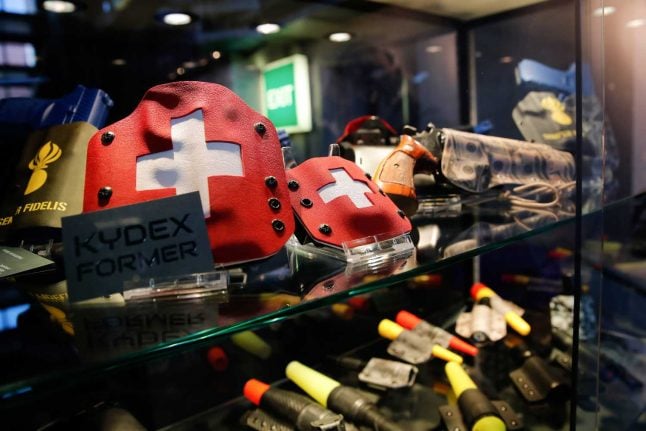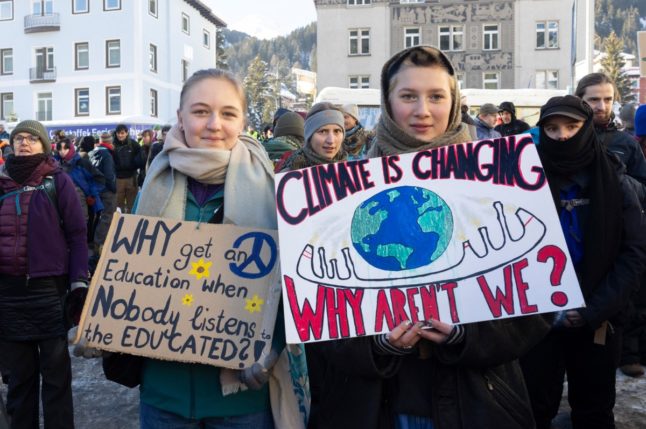With the second-highest gun ownership rate after the United States, Switzerland’s gun culture is both strong and unusual.
But while Europe’s ‘gun capital’ has an almost American-style love of weapons, they do also have a relatively stringent gun control regime.
EXPLAINED: Understanding Switzerland's obsession with guns
However, in the wake of Monday evening’s Vienna terrorist attack – where four people were killed and several more seriously injured after a rampage through the city’s historic centre – several right-wing Swiss politicians have demanded reforms to Switzerland’s gun laws.
Call for reform
Currently, while gun ownership is relatively free in Switzerland, gun owners require a special permit to carry their weapons in public.
Members of the right-wing SVP (Swiss People’s Party) and FDP (The Free Liberals) have called for gun owners to be allowed to carry their weapons in public.
Nicolas Rimoldi (FDP) took to Twitter, saying “Free citizens must be able to defend themselves and their loved ones against terrorists: the right to carry arms now!”
Freie Bürger müssen sich und ihre Liebsten gegen Terroristen verteidigen dürfen: Waffentragerecht jetzt! #Wien #Lyon #Nizza #Paris
— Nicolas A. Rimoldi (@narimoldi) November 2, 2020
Jean-Luc Addor, from the SVP in Valais, tabled a similar idea for a parliamentary initiative in 2017 and suggested that he would consider doing so again.
‘I brought this demand to the Parliament in 2017 . At that time I was a lone voice. Do you think the new Parliament is ready for such an idea?’
J’ai porté cette revendication au Parlement en 2017 https://t.co/A9lp7uwnbi. J’étais alors bien seul. Croyez-vous que le nouveau Parlement soit prêt pour une telle idée ? https://t.co/oaQG3djAdR
— Jean-Luc Addor (@udcvr64) November 3, 2020
Swiss law currently calls for people to “flee, hide and alert (authorities)” in the event of a terrorist attack.
Swiss love their guns
The nation of 8.3 million people has approximately 2.3 million guns, giving it the third highest gun ownership rate in the world after the United States and war-torn Yemen. Approximately 48 percent of Swiss households have at least one gun.
Contrast this with the US, where the number of guns overtook the number of people in the country in 2009. A study from the Swiss Graduate Institute of International and Development Studies found that there was 393 million guns in the US (2018 figures) for 326 million people.
READ MORE: Swiss vote to tighten gun laws and safeguard EU relations
READ MORE: Campaign launched for tougher gun laws in Switzerland
Approximately 41 percent of US households have at least one gun.
In Switzerland there has not been a mass shooting for almost 20 years.
In the US, there were more mass shootings in 2019 than there were days in the year, a study found.

Shoppers at a gun store in Switzerland. Photo: Stefan WERMUTH / AFP
The US lobby group the National Rifle Association (NRA), frequently credited as the main reason gun control continues to be stifled in the United States, has actually pointed to Switzerland’s widespread gun ownership and low crime rates – the country’s murder rate is almost zero – as a reason for fewer gun control restrictions.
However, the organisation fails to mention the widespread restrictions across Switzerland when it comes to using and owning weapons.
While Switzerland does have a higher rate of gun deaths than the European average, these are mainly due to suicide.
Swiss gun laws
Switzerland’s gun culture is mediated by a strong set of gun regulations on prospective and current gun owners.
The goal of Swiss gun regulators is to prevent the “violent and the incompetent” from owning guns. Anyone who possesses a “violent or dangerous attitude” will be restricted from gun ownership.

How comprehensive are Swiss gun laws? Photo by Bo Harvey on Unsplash
There are federal laws which regulate gun ownership, however a large proportion of gun regulation happens at the cantonal level.
Swiss authorities in each canton keep a log of all gun owners in the region, while cantonal police are also given the power to talk to psychiatrists or talk to representatives from other cantons as part of the vetting process when someone applies for a gun licence.
People who have been convicted of a crime as well as individuals with substance abuse problems will be prevented from owning a weapon.



 Please whitelist us to continue reading.
Please whitelist us to continue reading.
Member comments